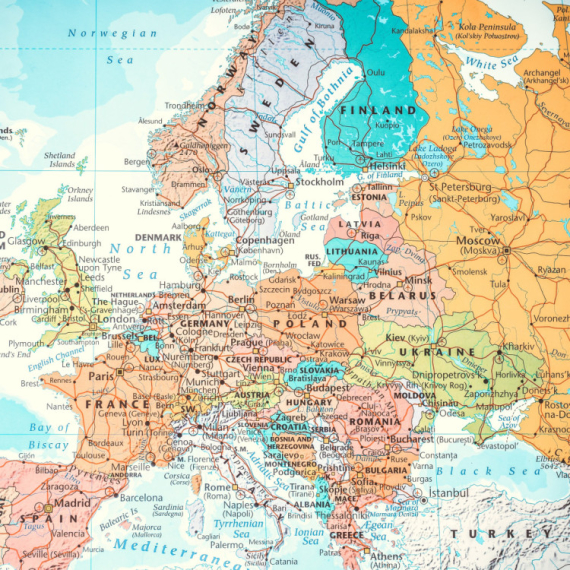Europe leaves Britain?
Saturday, 24.12.2011.
19:48

Europe leaves Britain? In today's British debate, there is a minority eurosceptic position which I can respect, although I completely disagree with it, and a majority eurosceptic position which I cannot respect, because it is rooted in self-deception. The minority eurosceptic position says: Britain's independence, sovereignty and freedom to manoeuvre in a fast-changing, increasingly post-Western world are supremely important to us. We recognise that by, by standing aside from the mainstream of European integration, we shall lose influence, also in the eyes of Washington and Beijing. We recognise that this English stance towards the European Union may hasten the departure of Scotland from the British Union. But that's a price we are prepared to pay. Norway without the oil? An offshore Switzerland? Why not? The English are a tough, inventive people and will find a way to negotiate the high seas of the twenty-first century. By contrast, the majority eurosceptic position, to which David Cameron essentially adheres, says: we can have our cake and eat it. Even though we stand aside from the central projects of European integration, our European and global influence will be undiminished. 'Let me say something about the UK's influence in Europe,' Foreign Office minister Henry Bellingham told the House of Commons last week. 'The decision not to proceed with a treaty at 27 has no impact on our status in the European Union.' This is ridiculous. Every cat in Brussels, every dog in Washington, every panda in Beijing, knows that is untrue. In fact, that decision came about precisely because Britain had marginalised itself in Europe. It was not Cameron's plan to end up 1 against 26. The crypto-Churchillian rhetoric of 'very well, alone' was after-the-event spin. Cameron thought he had a deal with Angela Merkel to get Britain the special provisions on financial services that it wanted. He miscalculated. At the crunch, Germany sided with France. When Cameron overplayed his hand, early on Friday morning, with everyone round the table conscious that global financial markets were opening in a few hours, he found himself alone. Since Britain is not a member of the eurozone, its members said, in effect, 'what business have you stopping us?' Crucially, there was no reservoir of goodwill round the table, such as there normally is to help an important member state address a domestic political difficulty. As a result of Cameron's decision to take the Conservatives out of the European People's Party (EPP) grouping in the European Parliament, he was not present at a crucial meeting of EPP leaders, including Merkel and Nicolas Sarkozy, just before the Brussels summit. If he had been, he might have got what he wanted. Marginalise yourself and you will be marginalised. Another variant of majority eurosceptic self-deception says: alright, we may lose influence in Europe, but not in the world. 'Isolated? No. Now the whole world's our oyster,' is the headline on a classic exemplar of this genre, by the right-wing columnist Simon Heffer. Freed from the shackles of 'the impossibly idealistic, sclerotic and corrupt European family', Britain can be off trading merrily with India, China and Brazil. Nor will America take us any less seriously. True, concedes Heffer, some Americans have a bizarre conception of Europe as some kind of a federal state like the US, but 'it should be a goal of our foreign policy to re-educate our American cousins out of this mindset'. Cousin Barack, Cousin Hillary, you have been warned. Prepare to be re-educated. This is self-delusion of a high order. But let's be honest. For every EU member state, there is a trade-off. You do lose some of your sovereignty and independence. In return, you gain influence, scale, clout - and therefore, the ability to secure more effective freedom, security and prosperity for your own people. As the British minister for Europe, David Lidington, himself reminded the Commons last week: 'one voice representing 500 million consumers is heard more loudly in Beijing, Delhi and Brasilia than 27 separate voices'. It is quite likely that this moment of apparent clarity - the parting of the ways! - will fade into the usual muddle next year. The eurozone has not been saved. Nick Clegg and the Foreign Office, helped by sympathetic, economically liberal member states, may somehow finagle Britain back into the game. Lots of other governments have special interests to protect. The whole thing is, as one diplomat observed, 'a bugger's muddle' - and Brits are widely considered to be good at those. But are we Brits really content to go on muddling through for another ten or twenty years? Both sides of the British argument about Europe can surely agree that we made a big mistake at some point over the last sixty years, even if we don't agree what it was. Those of us who think Britain's national interest requires that we remain full members of the EU will regard the fact that we stood aside at its birth in the 1950s as that historic mistake. Had Britain been present at the creation, this would have been a different EU. Those who believe the opposite will see the historic mistake in joining it, belatedly, in the 1970s, and then going along with further steps of integration. Either way, Britain can't afford another big mistake. My nightmare - which I also think quite probable - is that the Westminster closed circuit of parliament, government and press will continue to muddle this country (or what's left of it when Scotland has left) through to the margins of Europe. When the English discover, in five to ten years' time, that Heffer, Bellingham & Co are dead wrong; when the country's self-marginalisation is damaging its standing in Washington, its capacity to project its interests in China, India and Brazil, and the City of London; then it - now just England and possibly Wales - will come creeping back, saying 'please let us in', as Britain did in the 1960s. And then the French, Croats and Scots will decide whether to say 'oui' or 'non'. Now there's a vision from Charles Dickens' ghost of Christmas future. Timothy Garton Ash is Professor of European Studies at Oxford University, a Senior Fellow at the Hoover Institution, Stanford University, and the author, most recently, of Facts are Subversive: Political Writing from a Decade Without a Name If you see a fork in the road, take it! For sixty years, Britain has been following Yogi Berra's advice in its relations with Europe. At the end of 2011, the question is: can it continue to take both roads at once? If not, which should it choose? Timothy Garton Ash "If you see a fork in the road, take it! For sixty years, Britain has been following Yogi Berra's advice in its relations with Europe. At the end of 2011, the question is: can it continue to take both roads at once? If not, which should it choose?"
Europe leaves Britain?
In today's British debate, there is a minority eurosceptic position which I can respect, although I completely disagree with it, and a majority eurosceptic position which I cannot respect, because it is rooted in self-deception.The minority eurosceptic position says: Britain's independence, sovereignty and freedom to manoeuvre in a fast-changing, increasingly post-Western world are supremely important to us. We recognise that by, by standing aside from the mainstream of European integration, we shall lose influence, also in the eyes of Washington and Beijing. We recognise that this English stance towards the European Union may hasten the departure of Scotland from the British Union. But that's a price we are prepared to pay. Norway without the oil? An offshore Switzerland? Why not? The English are a tough, inventive people and will find a way to negotiate the high seas of the twenty-first century.
By contrast, the majority eurosceptic position, to which David Cameron essentially adheres, says: we can have our cake and eat it. Even though we stand aside from the central projects of European integration, our European and global influence will be undiminished. 'Let me say something about the UK's influence in Europe,' Foreign Office minister Henry Bellingham told the House of Commons last week. 'The decision not to proceed with a treaty at 27 has no impact on our status in the European Union.' This is ridiculous. Every cat in Brussels, every dog in Washington, every panda in Beijing, knows that is untrue.
In fact, that decision came about precisely because Britain had marginalised itself in Europe. It was not Cameron's plan to end up 1 against 26. The crypto-Churchillian rhetoric of 'very well, alone' was after-the-event spin. Cameron thought he had a deal with Angela Merkel to get Britain the special provisions on financial services that it wanted. He miscalculated. At the crunch, Germany sided with France. When Cameron overplayed his hand, early on Friday morning, with everyone round the table conscious that global financial markets were opening in a few hours, he found himself alone.
Since Britain is not a member of the eurozone, its members said, in effect, 'what business have you stopping us?' Crucially, there was no reservoir of goodwill round the table, such as there normally is to help an important member state address a domestic political difficulty. As a result of Cameron's decision to take the Conservatives out of the European People's Party (EPP) grouping in the European Parliament, he was not present at a crucial meeting of EPP leaders, including Merkel and Nicolas Sarkozy, just before the Brussels summit. If he had been, he might have got what he wanted. Marginalise yourself and you will be marginalised.
Another variant of majority eurosceptic self-deception says: alright, we may lose influence in Europe, but not in the world. 'Isolated? No. Now the whole world's our oyster,' is the headline on a classic exemplar of this genre, by the right-wing columnist Simon Heffer. Freed from the shackles of 'the impossibly idealistic, sclerotic and corrupt European family', Britain can be off trading merrily with India, China and Brazil. Nor will America take us any less seriously. True, concedes Heffer, some Americans have a bizarre conception of Europe as some kind of a federal state like the US, but 'it should be a goal of our foreign policy to re-educate our American cousins out of this mindset'. Cousin Barack, Cousin Hillary, you have been warned. Prepare to be re-educated.
This is self-delusion of a high order. But let's be honest. For every EU member state, there is a trade-off. You do lose some of your sovereignty and independence. In return, you gain influence, scale, clout - and therefore, the ability to secure more effective freedom, security and prosperity for your own people. As the British minister for Europe, David Lidington, himself reminded the Commons last week: 'one voice representing 500 million consumers is heard more loudly in Beijing, Delhi and Brasilia than 27 separate voices'.
It is quite likely that this moment of apparent clarity - the parting of the ways! - will fade into the usual muddle next year. The eurozone has not been saved. Nick Clegg and the Foreign Office, helped by sympathetic, economically liberal member states, may somehow finagle Britain back into the game. Lots of other governments have special interests to protect. The whole thing is, as one diplomat observed, 'a bugger's muddle' - and Brits are widely considered to be good at those.
But are we Brits really content to go on muddling through for another ten or twenty years? Both sides of the British argument about Europe can surely agree that we made a big mistake at some point over the last sixty years, even if we don't agree what it was. Those of us who think Britain's national interest requires that we remain full members of the EU will regard the fact that we stood aside at its birth in the 1950s as that historic mistake. Had Britain been present at the creation, this would have been a different EU. Those who believe the opposite will see the historic mistake in joining it, belatedly, in the 1970s, and then going along with further steps of integration.
Either way, Britain can't afford another big mistake. My nightmare - which I also think quite probable - is that the Westminster closed circuit of parliament, government and press will continue to muddle this country (or what's left of it when Scotland has left) through to the margins of Europe. When the English discover, in five to ten years' time, that Heffer, Bellingham & Co are dead wrong; when the country's self-marginalisation is damaging its standing in Washington, its capacity to project its interests in China, India and Brazil, and the City of London; then it - now just England and possibly Wales - will come creeping back, saying 'please let us in', as Britain did in the 1960s. And then the French, Croats and Scots will decide whether to say 'oui' or 'non'.
Now there's a vision from Charles Dickens' ghost of Christmas future.
Timothy Garton Ash is Professor of European Studies at Oxford University, a Senior Fellow at the Hoover Institution, Stanford University, and the author, most recently, of Facts are Subversive: Political Writing from a Decade Without a Name


























































Komentari 3
Pogledaj komentare